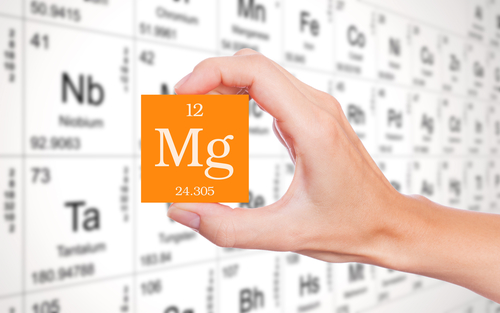Most of us know we need certain vitamins and minerals in our body in order for it to work optimally. We know we need things like vitamin C and Iron in order to be healthy, but few of us ever give any thought to whether or not we’re getting enough magnesium in our diets.
In order to understand why you most likely have a deficiency, it’s important to understand that magnesium is a natural biological antagonist to calcium. And that means the more you have of one in your body, the less you’ll have of the other. Since most American adults have excess calcium in their body, they naturally have too little of magnesium. To the typically body that is quite literally overwhelmed with calcium, supplementation with magnesium can be very beneficial.
The Calcium Myth
While a deficiency of calcium in the bones of the elderly is common, there is no such thing as a body-wide calcium deficiency. What is more common is that there is a body-wide excess. Magnesium acts much like a prescription calcium channel blocker which limits the amount of calcium the body’s cells take in. This calcium blocking can benefit conditions such as asthma, migraines, hypertension, stroke and inflammation in general.
But What about Osteoporosis?
Because of its special relationship with calcium, magnesium benefits those at risk of osteoporosis. It is not only able to normalize calcium metabolism, it has also been proven to increase bone density and decrease fracture incidence. Magnesium also has the ability to dissolve abnormal calcium deposits outside of the bone.
Equally significant is magnesium’s ability to decrease elevated intracellular levels of calcium, which is a very significant component of all chronic diseases, including cancer. Conversely, a magnesium deficiency has been documented to promote abnormal calcium deposits outside of bones, increase the levels of calcium inside cells, and promote osteoporosis and the growth of cancer cells.
Magnesium’s Other Amazing benefits
As if the previously mentioned benefits weren’t enough to ensure you maintained proper levels of magnesium in your body, there are even more benefits to this powerful chemical element. For instance, magnesium has been shown to help the body regulate insulin. It has also been shown to have anti-atherosclerotic effects and play a significant role in improving brain function and learning.
Study after study has now pointed to a startling fact: magnesium has the ability to decrease all-cause mortality. This means that if you have a deficiency your cells will be sicker, and if you have the right levels of magnesium in your body, your compromised cells will be restored to health.
12 Symptoms of Magnesium Deficiency
Some common symptoms which indicate you may have a magnesium deficiency are:
- Poor heart health
- Weakness or cramping of muscles
- Tremors
- Nausea
- Anxiety
- High blood pressure
- Type II diabetes
- Respiratory issues
- Dizziness
- Fatigue
- Potassium deficiency
- Poor memory and confusion
It is important to mention that while the above symptoms do indicate a magnesium deficiency, you do not necessarily have a deficiency if you have any of these symptoms, which can indicate other health issues you may be experiencing. You should always speak with your doctor if you experience any of the above.
Supplementing with Magnesium
Studies have shown the powerful effects of magnesium supplementation on patients who are at great risk of a heart attack or who have already experienced one in the past. In these studies a continuous infusion of magnesium was given over either a 24 or 48-hour period. In both studies, patients had a decreased all-cause mortality rate for a full 5 years following the studies.
Those results are undeniably incredible. In fact, medical experts have not been able to come up with any other medicine, nutrient or “beneficial agent” that, when administered for only 1 to 2 days, has such a profound positive impact and for such an extended period of time.
What is the Best Source of Magnesium?
In a perfect world we would all get our minerals and vitamins from whole, healthy food sources. If you wish to go that route, some foods high in magnesium content are dark leafy greens like spinach, kale and Swiss chard; nuts and seeds like almonds, pecans and flaxseeds; fish like wild salmon, mackerel and tuna; soybeans, chickpeas and lentils; avocados; bananas; and dark chocolate.
If you do not like the above foods but still want to make sure you are getting enough magnesium in your diet, consider taking a magnesium supplement such as magnesium glycinate, which contains an amino acid that is needed in abundance by the body.
Take note that large amounts of magnesium in any oral form can cause diarrhea, so it’s a good idea that you know your bowel tolerance before taking a supplement. If bowels allow, a good amount to take daily would be 300 to 500 mg. If you can only tolerate 100 mg per day, that’s okay, too. Any amount of magnesium you can get in is better than no magnesium.
 Validating...
Validating... 



51 Comments